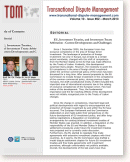Choice of forum in bills of lading before Greek courts
Dr. Apostolos Anthimos is attorney at law at the Thessaloniki Bar, Greece. He holds a Ph.D. in International Civil Litigation and is a visiting lecturer at the International Hellenic University. He can be reached at: apostolos@anthimos.gr
A recent judgment from the Thessaloniki Court of Appeal addressed the issue of the validity of jurisdiction agreements in contracts for the carriage of goods by sea.
The facts of the case are simple: A Greek company purchases goods from a Dutch company; goods are to be sent to the port of Thessaloniki, where the Greek company has its seat. A commission agent is entrusted with the transport details to Thessaloniki. Loading takes place in the port of Kotka, Finland, on a ship with Bulgarian flag. The Dutch carrier signs the bill of lading and he then endorses it to the Greek buyer, who becomes its legal holder. The latter concludes an insurance agreement with a Greek company. Due to erosion caused by seawater, goods were damaged. The Greek insurance company paid the agreed price to the buyer. It then files claim against the Dutch carrier and the Greek commission agent before the Thessaloniki first instance court; the latter rejected the action on the grounds of lack of international jurisdiction, emanating from a choice of forum clause in favor of Hong Kong courts in China, embedded in the general terms of the bill of lading.
The appeal court’s analysis began by Art. 23 of the Brussels Regulation and the need for its narrow interpretation in respective cases, in light of the ECJ ruling in the Tilly Russ case. It then continued with the analysis of domestic law provisions regarding derogation agreements, which presupposes the existence of signatures from both parties at large, namely the captain or an authorized agent on the one side, and the shipper or the recipient of goods on the other side. Finally, it concluded that the choice of forum included in the bill of lading was null and void because it wasn’t signed from both parties. The court underlined that the subsequent signature by the recipient (i.e. when the bill of lading was endorsed) took place only with the purpose of completing the transfer of the bill’s rights in personam and in rem, and does not include any agreement or consent as to the prorogation clause. It went then further, stating that the jurisdiction agreement was not concluded in a form, which accords with a usage of which the buyer was or ought to have been aware. Finally, the court found that no continuous commercial links between the parties were proven, and rejected the respective argument by the appellees.
By reading this ruling, two are the main conclusions to be drawn from: First, the Thessaloniki Appeal Court applied the Brussels Regulation despite the clear wording of Art. 23.1, which excludes control over prorogation agreements in favor of a court or courts of non – member states from its ambit. This is not the first time Greek courts are opting for this approach, and it happens even after the ECJ ruling in the Coreck case. Additionally, the facts of the case give no rise for supporting a potential violation of the so-called protective jurisdictional bases (Art. 13, 17 & 21 Brussels I Regulation), which would be reason enough to bring back the Regulation into play [see in detail Rauscher/Mankowski, EuZPR/EuIPR (2011), Art. 23, Nr. 3a, 532, (Magnus)/Mankowski, Brussels I Regulation (2012), Art. 23, Nr. 37, 458].
Secondly, this decision echoes a well-established jurisprudence, which started with a 1994 Supreme Court ruling, and has been followed with minimal exceptions ever since, one of which was the quashed ruling of the Thessaloniki 1st instance court. Regrettably, courts are making no distinction in terms of applicable law, i.e. whether the case should be tried according to Art. 23 Brussels Regulation or domestic choice of forum rules (Art. 42-43 CCivP). Hence, failure of the seller to produce a bill of lading bearing both signatures leads to its nullity concerning the prorogation clause, and regardless whether the case falls into the scope of the Regulation or not. This runs contrary to the prevailing opinion of legal doctrine on the application of Art. 23 Brussels Regulation in Greece and abroad [see for instance (Magnus)/Mankowski, Brussels I Regulation (2012), Art. 23, Nr. 138, p. 499 et seq., Reithmann/Martiny/Hausmann, Internationales Vertragsrecht, 7. Auflage (2010), p. 1993 et seq., Nr. 6464, note 2, Rauscher/Mankowski, EuZPR/EuIPR (2011), Art. 23, Nr. 54a, 585, Staehelin, Gerichtsstandsvereinbarungen im internationalen Handelsverkehr Europas: Form und Willenseinigung nach Art. 17 EuGVÜ/LugÜ (1994), p. 89 et seq].

 The last issue of the Revue critique de droit international privé was just released. It contains five articles and several casenotes. A full table of contents can be found
The last issue of the Revue critique de droit international privé was just released. It contains five articles and several casenotes. A full table of contents can be found 